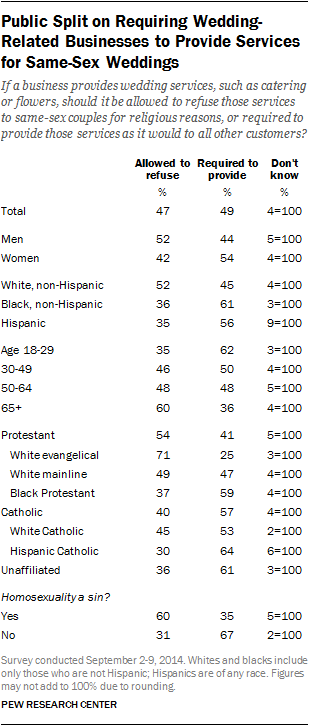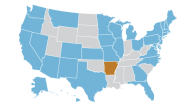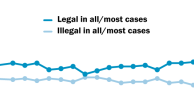Homosexuality and Same-Sex Marriage

The public is evenly divided over whether businesses that provide wedding services, like catering or flowers, should be required to provide services to same-sex couples despite religious objections to same-sex marriage. Half (49%) say that wedding-related businesses should be required to provide services to same-sex couples just as they would to all other customers, while 47% say that these businesses should be allowed to refuse services to same-sex couples for religious reasons.
More men than women say that businesses should be allowed to refuse services for same-sex weddings for religious reasons (52% vs. 42%), and whites (52%) are more likely than either blacks (36%) or Hispanics (35%) to say the same. There is also a large generation gap on this issue. Most Americans ages 65 and older (60%) say that wedding-related businesses should be able to decline to provide services for same-sex weddings, while most adults under the age of 30 (62%) take the opposite view, saying that businesses should be required to provide services for same-sex weddings. Those between the ages of 30 and 64 are evenly divided on this question.
Among religious groups, white evangelical Protestants express the strongest support for allowing businesses to refuse to provide services for same-sex weddings (71%). At the other end of the spectrum, majorities of Hispanic Catholics (64%) and the religiously unaffiliated (61%) say businesses should be required to provide wedding services for same-sex couples, as do 59% of black Protestants. White Catholics and white mainline Protestants are more evenly split on this question.

The survey also finds a close link between views of whether homosexual behavior is a sin and requiring businesses to provide services for same-sex weddings. Among those who say homosexual behavior is a sin, six-in-ten say that businesses should not be required to provide services for same-sex weddings. But among those who say homosexual behavior is not a sin, two-thirds say businesses should be required to service same-sex weddings.
The number of people who view homosexual behavior as sinful has ticked up in the past year, from 45% in 2013 to 50% in the current poll.
The view that homosexual behavior is sinful is most common among white evangelical Protestants (82%) and black Protestants (77%). By contrast, nearly three-quarters of religious “nones” (72%) say that homosexual behavior is not sinful. White mainline Protestants and Catholics are more evenly divided about whether homosexual behavior is sinful.

The current poll finds 49% of the public expressing support for same-sex marriage and 41% expressing opposition. Three-quarters of white evangelical Protestants oppose same-sex marriage. By contrast, three-quarters of the religiously unaffiliated support allowing gays and lesbians to marry legally. There is also more support than opposition to same-sex marriage among Catholics and white mainline Protestants.
Support for same-sex marriage in the current poll is on par with Pew Research polls conducted in 2013, when 50% expressed support for same-sex marriage and 43% registered opposition, but down slightly from a February 2014 Pew Research poll that found 54% support for same-sex marriage. It is too early to know whether this is an anomaly or the beginning of a reversal or leveling off of the growth in support for same-sex marriage widely observed in polls over the past decade.
Size of Government

About half of U.S. adults say they would prefer a smaller government with fewer services (50%), while 42% prefer a bigger government with more services. These findings are comparable to polling conducted in 2013.
Nearly eight-in-ten Republicans and those who lean toward the GOP (78%) say they prefer a smaller government that provides fewer services. Most Democrats express the opposite view, with 62% saying they prefer a bigger government that provides more services.
Among religious groups, majorities of white evangelicals (70%), white Catholics (61%) and white mainline Protestants (56%) prefer a smaller government, while Hispanic Catholics (72%) and black Protestants (65%) prefer a bigger government. Among the religiously unaffiliated, equal shares express a preference for a smaller government and a bigger government (47% each).
Abortion

U.S. public opinion has also remained largely stable on the issue of abortion. A majority of Americans (55%) express the opinion that abortion should be legal in all or most cases; four-in-ten say it should be illegal in all or most cases.
There is little difference in opinion about abortion between men and women. Generational differences also are muted, though Americans ages 65 and older express more opposition to abortion than do younger adults. About two-thirds of Democrats and those who lean Democratic (65%) say abortion should be legal in all or most cases, while among Republicans and those who lean toward the GOP, 52% say abortion should be illegal in all or most cases and 44% say abortion should be mostly legal.
Among religious groups, white evangelical Protestants express the strongest opposition to abortion; two-thirds say it should be illegal in all or most cases. By contrast, three-quarters of religious “nones” (75%) say that abortion should be legal in all or most cases, as do two-thirds of white mainline Protestants (65%). Catholics and black Protestants are more evenly split on this issue.




